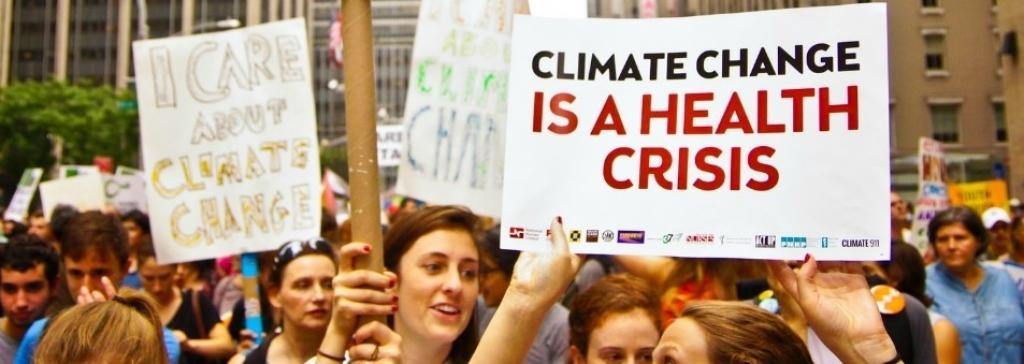On 7-18 November 2016, delegates from 196 countries gathered at the 2016 United Nations Climate Change Conference in Marrakech, Marocco, to continue negotiations on the outstanding issues relating to the implementation of the Paris Agreement. On that occasion, over two dozen ministers and senior officials responsible for health and environment agreed to the Ministerial Declaration on “Health, Environment and Climate Change”, confirming a growing willingness on the part of UN agencies and member states to more closely link the two fields and consider health as a central component of the climate agenda.
The Declaration signals the need to reduce the estimated 12.6 million deaths associated each year with modifiable environmental factors. This constitutes almost a quarter of the global burden of disease, and climate change is one of the main drivers of these risks: extreme heat, natural disasters, variable rainfall patterns, changing patterns of infection, among others, directly impact health, leading to soaring healthcare costs all over the world. Even more importantly, the Declaration calls for a more integrated and inter-sectoral approach to “enhancing health, reducing inequalities, promoting sustainable food production and consumption, and protecting the environment”, particularly by promoting policy coherence, efficiency and equity.
This means that national health capabilities must be strengthened to deal with the prevention and treatment of environment-related illnesses, for example, through better surveillance and early warning systems. At the same time, it is also crucial that climate negotiations become more open to health professionals and that climate change mitigation policies maximise health co-benefits, for example, through reductions in short-lived climate pollutants, the promotion of low-carbon urban transport and housing, and increased access to electricity and sustainable food.
Making the right to health central to the implementation of the Paris Agreement effectively concurs to establish the Agreement itself as a “public health treaty”, in the words of Dr Maria Neira, Director of the WHO Department of Public Health, Environmental and Social Determinants of Health. As noted by the Ministerial Declaration, however, no global high-level alliance exists to address the complex set of challenges at the interface of climate change and health. Therefore, fostering a more active involvement of international organisations, member states, civil society groups, the private sector and academia will be extremely important. This means, among others: encouraging countries to include health considerations in their ‘Nationally Determined Contributions’; making sure that the linkages are taken into account in every relevant conference, framework or agenda, consistent with the transformative approach underlying the 2030 Agenda for Sustainable Development; and compiling best practices, as well as mobilising technical expertise and resources in a spirit of cooperation.
The World Health Organization has been a central advocate for this integrated approach. In Marrakech, WHO organised the Ministerial Meeting for the adoption of the Ministerial Declaration, and a UN system-wide side event on climate change mitigation in the context of SDG 3.
During this side event, which was held on 15 November in the Blue Zone of COP22, Dr Maria Neira praised the adoption of the Ministerial Declaration and urged all UN agencies and bodies to provide concrete assistance to ministers of health and environment to implement a coherent climate-health agenda. Dr Neira, Dr Diarmid Campbell-Lendrum (WHO Team Leader on Climate Change and Health) and Dr Carlos Dora (WHO Coordinator of Interventions for Healthy Environments) further highlighted the importance of mutually reinforcing frameworks for action between the Paris Agreement and the SDGs, whereas other panellists provided concrete examples of how these synergies might be dealt with in practice.
Among them, Karolina Skog, Minister for the Environment of Sweden, particularly focused on the need to acknowledge potential trade-offs between some climate change policies and health, for example the rise of less-carbon intensive diesel fuel is worsening the parallel problem of air pollution in many cities. In addition, Dr Rhys Jones from the University of Auckland discussed the role of the ‘right to health’ framework in promoting countries’ accountability on climate action, thereby complementing the ‘light’ compliance mechanisms of the Paris Agreement. Finally, Michele Emiliano, Governor of the Apulia region of Italy, advocated for decarbonisation policies at the local level as a means of reducing emissions from polluting industries while safeguarding jobs and protecting human health.
In line with the action agenda agreed at the Second Global Conference on Health and Climate, held on 7–8 July 2016 in Paris, all the interventions ultimately emphasised that addressing the threat of climate change is potentially “the greatest public health opportunity of the century”, requiring a transformation of economies and societies towards disease prevention, protection of ecosystem services, reduction of inequality, and a broader alignment with the principles of sustainable development.
Photo: Light Brigading/cc/flickr


